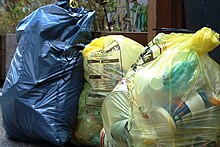Household garbage
Household waste or household waste , in contrast to industrial waste or commercial waste, is a waste mixture from private households and comparable facilities, which is usually filled in garbage cans or sacks and taken away by publicly or privately organized garbage collectors. With regard to the types of municipal waste, domestic waste is defined in Germany as "solid waste from private households that is collected and emptied by the persons obliged to dispose of it themselves or by third parties in standardized emptying containers prescribed in the waste disposal area" and thus differs from bulky waste or the so-called household-like commercial waste .
Germany
In Germany, orderly waste disposal has been aimed for since the mid- 1970s and, since the 1990s, greater emphasis has been placed on waste avoidance , separate collection and recycling, especially for waste from private households. Increasingly, a modern waste management developed from this , which is to be further developed into a sustainable circular economy .
As a result, some of the original waste disposal methods, such as landfill , have become significantly less important. Landfilling of untreated household waste has been prohibited in Germany since June 1, 2005. Household waste, as far as it does not advance by separate collection in Germany recovery was supplied either in waste incineration plants burned to generate electricity or heat (approximately 17 million tons in 2006), or in mechanical biological waste treatment plants treated (around 4 million tonnes in 2006). According to the Recycling Management Act (KrWG) of the Federal Republic of Germany, however, the material recycling of waste has priority over the energetic recycling. Only from 11 MJ / ton, energetic recovery is legally equivalent to material recovery.
When collecting waste from private households separately, a distinction can be made between the following types of waste:
- residual waste
- Biowaste
- Waste paper , more precisely cardboard, paper, cardboard boxes (PPK)
- Waste glass
- Lightweight packaging (LVP), see Green Dot
- Hazardous waste
- Bulky waste
- Bulky metal waste in some communities
- Electronic scrap
- Garden waste
- Collection of old clothes for textiles
The first industrial waste separation and partial recycling of waste took place in Germany as early as 1898 at Hausmüllverwertung München GmbH .
Web links
- Ways of our household waste - NABU - Naturschutzbund Deutschland eV
literature
- Helmut Paschlau, Ermbrecht Rindtorff: Recycling household waste. Where does the “commercial collection” lead? In: Müll und Abfall 36 (11), 2004, pp. 534-539, ISSN 0027-2957 .
- Heike Ehrmann, Carl-Friedrich Elmer, Andreas Brenck: The disposal of household waste in Germany - development and perspectives from the consumer's point of view . In: Müll und Abfall 38 (4), 2006, pp. 178-185, ISSN 0027-2957 .
- Rolf Schiller, Dornier-System GmbH, Immenstaad: Separate household waste collection. Investigation into the separation and recycling of paper and glass from household waste, illustrated using the example of the city of Konstanz. Study on behalf of the Federal Minister of the Interior and the Federal Environment Agency. Final report 1976.
- Klaus Wahl: Multi-chamber garbage system for recovering valuable materials from household waste. In: Müll und Abfall 4/1981, pp. 85–93 (also in special print).
- Rolf Schiller: Cabal about household waste. Verrai Verlag, Stuttgart 2017, ISBN 978-3-946834-38-0 .
- Roman Köster : Household waste. Waste and Society in West Germany 1945–1990 (= Environment and Society . Volume 15 ). 1st edition. Vandenhoeck & Ruprecht, Göttingen 2017, ISBN 978-3-525-31720-4 (438 pages, also habilitation thesis, Universität der Bundeswehr Munich 2015).
Individual evidence
- ^ Klaus Cord-Landwehr: Introduction to waste management. Springer 2002, p. 15, Google books
- ^ Richard A. Zahoransky, Hans-Josef Allelein, Elmar Bollin, Helmut Oehler, Udo Schelling, Harald Schwarz: Energy technology: Systems for energy conversion; Compact knowledge for studies ... - Richard A. Zahoransky, Hans-Josef Allelein, Elmar Bollin, Helmut Oehler, Udo Schelling, Harald Schwarz . Springer DE, 2013, ISBN 3-8348-2279-5 , pp. 378 ( limited preview in Google Book search).
